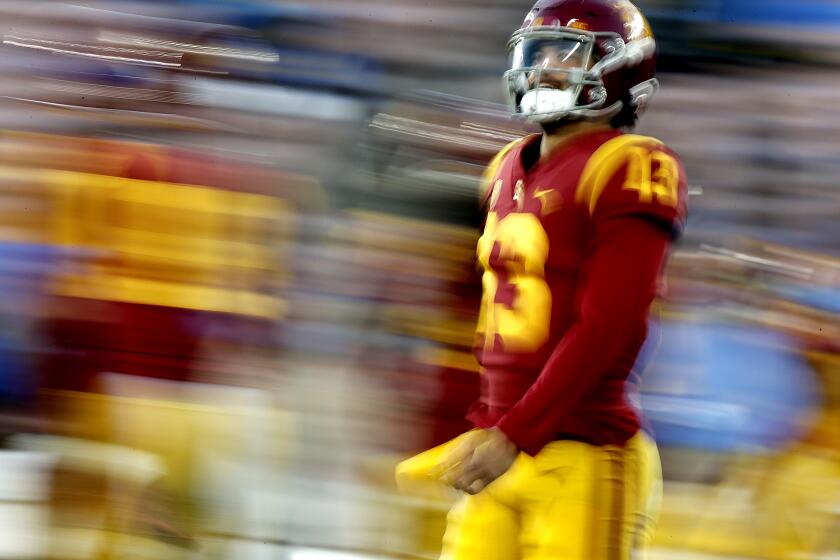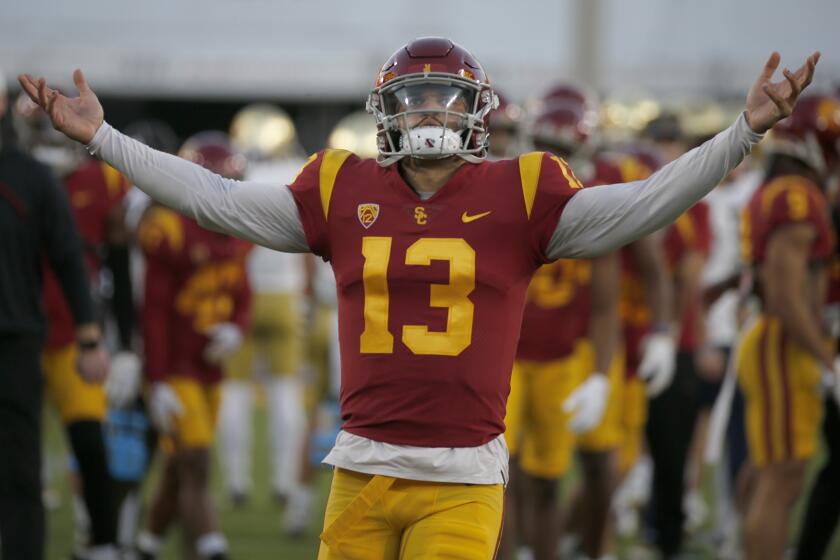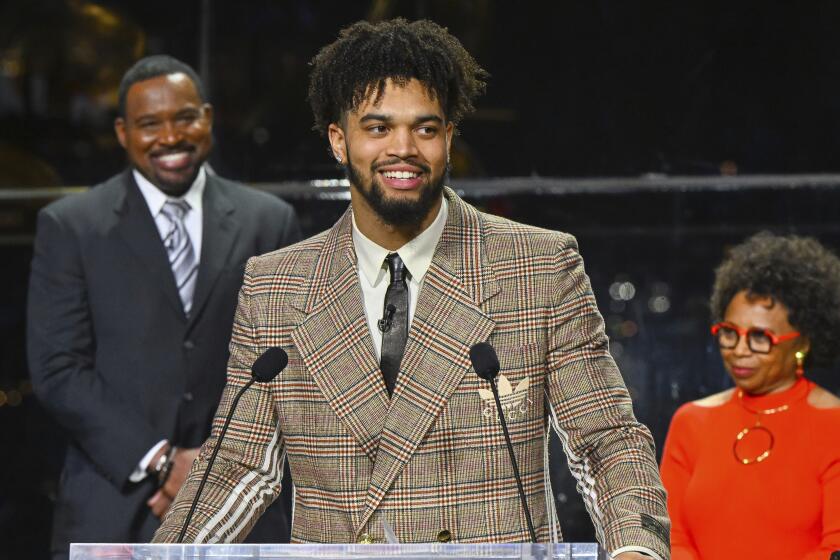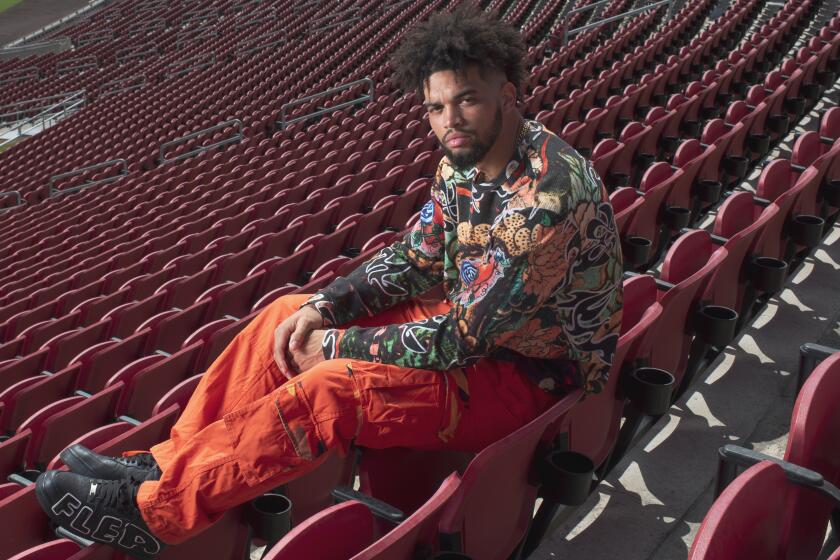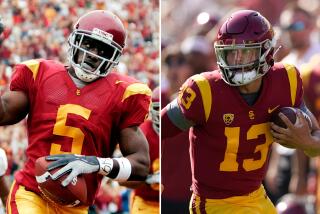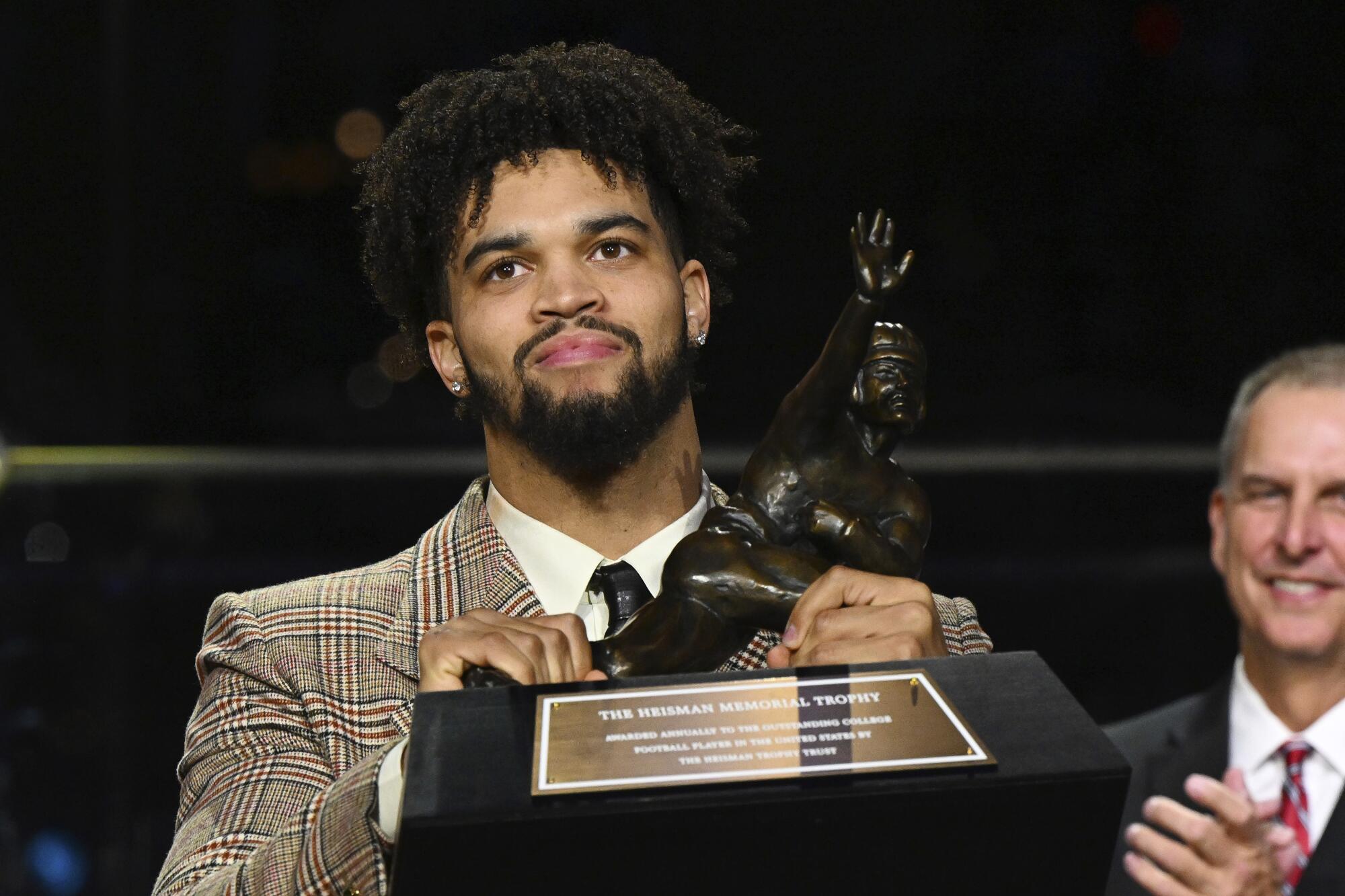
- Share via
NEW YORK — Since Caleb Williams landed in Los Angeles last February as the most coveted transfer in all of college football, the quarterback has carried the weight of tremendous expectation on his shoulders.
USC, after a decade of disappointment and scandal, anointed him. The rest of the country, dismayed by his exit from Oklahoma, questioned him. Brands, seeing a burgeoning star in the name, image and likeness era, invested in him. But as the pressure mounted and the stakes raised, Williams would rise to the occasion in a way few have in the sport’s history, not only reviving a dormant powerhouse at USC, but announcing himself as the best player in college football in the process.
The official coronation finally came Saturday, as Williams lifted the Heisman Trophy, becoming the first Trojan to win the illustrious award since Reggie Bush in 2005.
Despite his relatively late arrival to the Heisman conversation this season, Williams won the award handily, beating Texas Christian’s Max Duggan, Ohio State’s C.J. Stroud and Georgia’s Stetson Bennett, each of whom will get a shot at a national title as their consolation prize.

Williams’ stellar campaign would finish just short of those same heights, as USC fell in the Pac-12 title game to Utah despite the quarterback’s heroic effort battling through a painful hamstring injury.
“I may be standing up here today, but y’all get to go to the College Football Playoff,” Williams said to the other finalists. “Guess you can’t win them all.”
But while Duggan, Stroud and Bennett — who finished second, third and fourth, respectively — may have lifted their teams to the national semifinals, Williams still entered Saturday’s ceremony as the overwhelming Heisman favorite, a testament to the transformative power of his presence at USC this season. Williams tallied 2,031 total points, including 544 first-place votes, 356 more than Duggan, the runner-up.
When his name was announced as the 87th winner of the prestigious award, Williams, dressed in a plaid Gucci suit, took his place at a podium on stage at the Lincoln Center, where two dozen past winners of the Heisman, including three of the seven other former Trojan honorees, awaited.
Caleb Williams won the 88th Heisman Trophy on Saturday night in New York. Here’s everything you need to know about the USC quarterback.
Williams is the eighth USC player to take home the Heisman Trophy, the most of any school; though, the Heisman Trust still only officially acknowledges seven after the NCAA sanctions levied against USC saw Bush stripped of his trophy. Not since 2005, when Bush won, has USC even sent a finalist to New York.
As he spoke, Williams reflected on the formative moments that led him to this one: The car ride home at 10 years old, when he assured his father, Carl, he’d do anything to be great. The tears he shed at 12, when his coach told him he was “too small” to play in a championship game. The 5:30 a.m. workouts with “The Breakfast Club”. The legendary Hail Mary at Gonzaga College High.
“I used to write down my goals in a journal,” Williams said, “and what used to just be words on a piece of paper has me standing here today.”
His journey at USC, while only 10 months long thus far, would present its own adversity. Certainly none of USC’s previous winners walked into a situation quite like Williams did this season.
USC was already a national football power under John McKay when running backs Mike Garrett and O.J. Simpson rolled to Heisman wins in 1965 and 1968, respectively. Charles White won a national championship at USC the year before hoisting his trophy in 1979. His backup that season, Marcus Allen, would go on to win, too, just two years later.
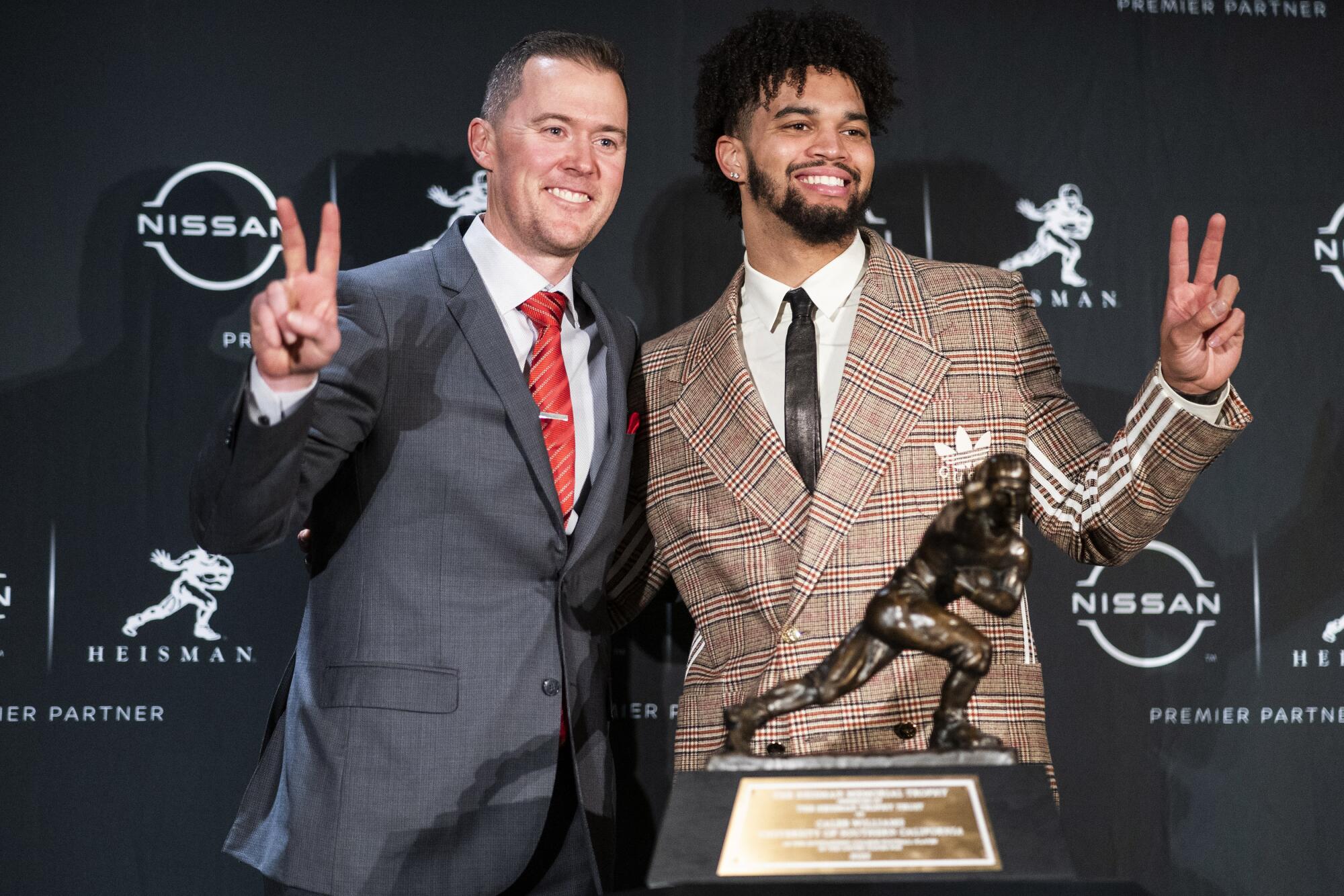
“I’ve just been in awe watching him. ... People are finally starting to recognize that this guy is the best player in the country.”
— Carson Palmer, former USC quarterback and 2002 Heisman Trophy winner, on Caleb Williams
Perhaps only Carson Palmer, who quarterbacked the Trojans through the transition from Paul Hackett to Pete Carroll, could relate to how far Williams had to carry USC for his campaign to be considered Heisman caliber. But even Palmer had three seasons to find his stride at USC before the Trojans came alive under Carroll, a run that would later produce two national titles and two more Heisman winners (Matt Leinart in 2004 and Bush in 2005).
“I’ve just been in awe watching him,” Palmer told The Los Angeles Times. “I watched the team play the year before. It was tough. It was painful to watch. So to see how quickly the tide has changed … people are finally starting to recognize that this guy is the best player in the country.”
Leinart went even further.
“He’s as rare as they come, in my opinion,” he said of Williams. “The talent level, the things he does on the field, they’re one of one. No one can do that. Not even at the next level.”
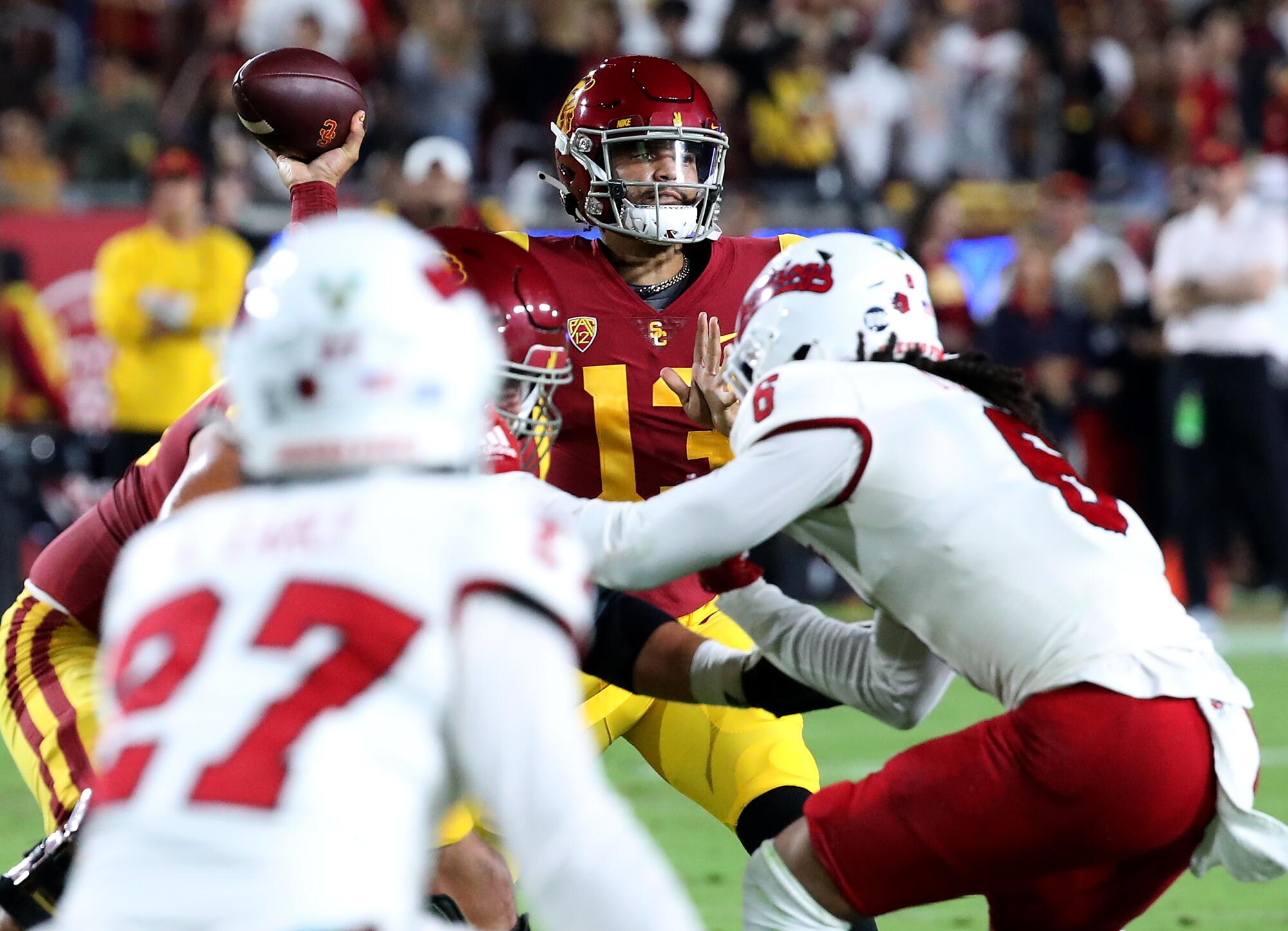
When Williams took the reins, there was no serious talk of national titles or Heisman hopefuls, not outside the confines of Heritage Hall at least. USC had completely unraveled the previous season, firing coach Clay Helton just two weeks into a disastrous 4-8 campaign, a frustrating nadir for one of college football’s foremost programs.
While taking over last November, new coach Lincoln Riley vowed to bring USC back to prominence. But doing so required the services of his chosen star quarterback, whom Riley left behind in Oklahoma.
Convincing Williams to follow him to USC meant mending some fences with Williams and his family. Riley’s rebuild was well underway when he rang Williams, whom he knew could be the crown jewel of what became a 25-transfer class. The quarterback was on vacation, walking alone on a Florida beach to clear his head about his entrance into the transfer portal, when the coach called. The conversation, as it turned out, would mark a turning point in the storied history of USC football.
An attempt at ranking all eight USC Heisman Trophy winners. Where do Caleb Williams, Reggie Bush and O.J. Simpson rank?
“As soon as we started talking,” Williams said this week, “it started up again.”
The conversation, as it turned out, would mark a turning point in the storied history of USC football.
Their renewed partnership would be the catalyst for a complete turnaround, as the Trojans won 11 of their first 12 games for the first time since 2008. Williams soared even higher in his second season at the helm of Riley’s offense, a scheme now responsible for three of the last six Heisman winners (Williams, Kyler Murray and Baker Mayfield), as well as an additional Heisman finalist (Jalen Hurts).
Like the other two Riley-coached quarterbacks who graced that stage, Williams began his career at another school, the fourth transfer since 2017 to take home the trophy. As Williams accepted the award on Saturday night, USC’s coach watched bleary-eyed from the front row.
“To take over the job at two storied programs, in the fashion that he did, neither one of them was a normal path to becoming a starting quarterback at a major university and big-time college football team, that takes guts,” Riley said. “You get out there, there’s nobody to catch you when you fall. Places like this, to play quarterback, you gotta perform. Your successes and failures are out there for the entire world to see and the entire world to judge, and believe me, everyone has an opinion. So it takes a special kind of confidence and drive, especially that young.”
Williams accounted for 47 touchdowns this season (10 on the ground), the most of any player in college football. His 4,075 passing yards are the second-most in a single season in USC history — and sixth-most in the nation this season — while his 372 yards rushing are the most for a USC quarterback.
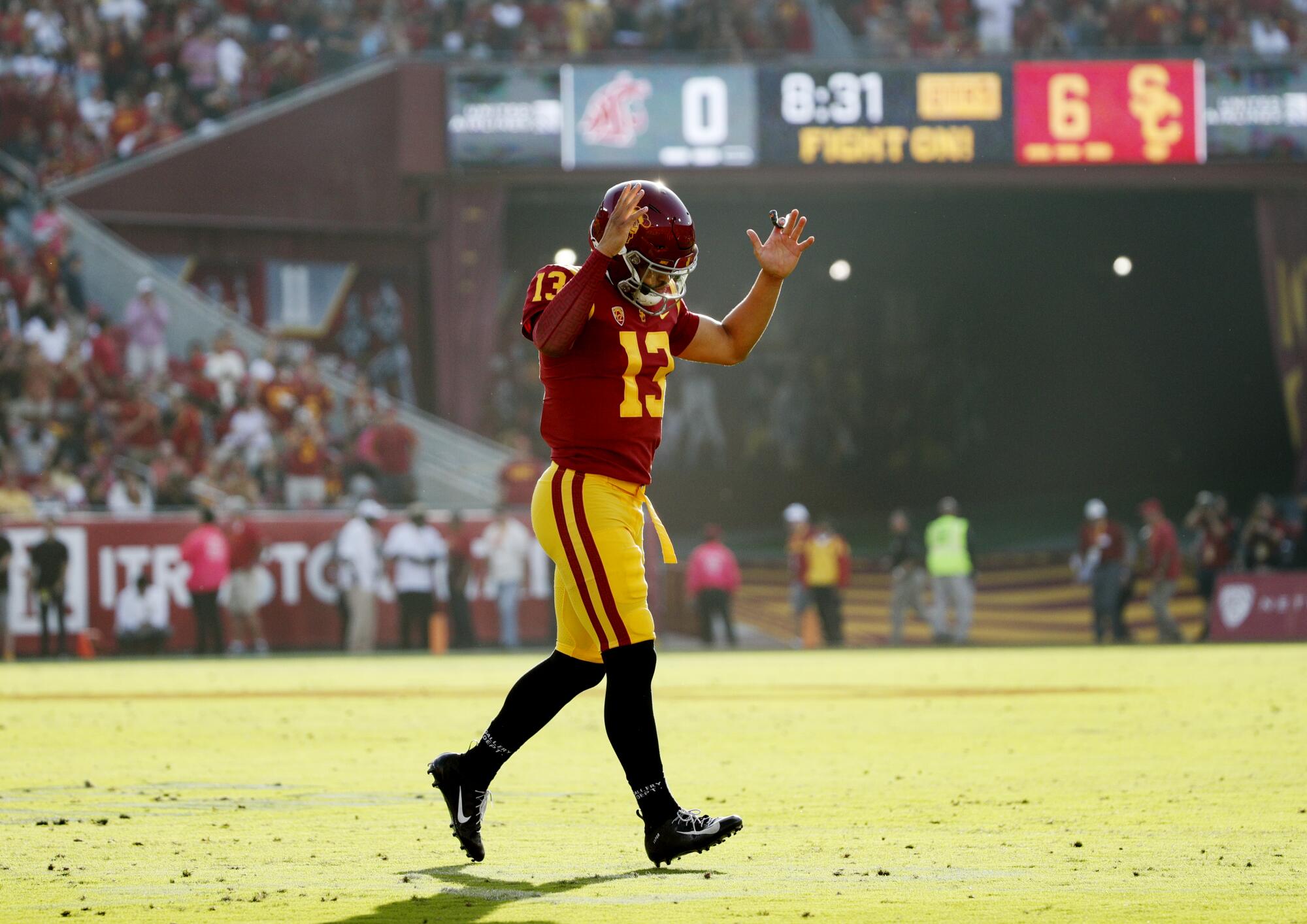
“The talent level, the things he does on the field, they’re one of one. No one can do that. Not even at the next level.”
— Matt Leinart, former USC quarterback and 2004 Heisman Trophy winner, on Caleb Williams
If Williams is able to play in the Cotton Bowl next month, he’s likely to own nearly all of the Trojans’ single-season passing records by season’s end.
Still, as remarkable as his stats may be, Williams’ case for the Heisman was further fortified this season by his formative role in USC’s renaissance. From Day 1, teammates say, the transfer quarterback stepped in with a swagger that lifted the locker room, changing a culture that had previously come apart at the seams.
Evidence of that influence was present with him on Saturday night. In the gallery at Lincoln Center sat eight of USC’s offensive linemen, each of whom he flew to New York and thanked personally, by name, from the stage. Williams said he’d refused to come to the ceremony without them.
“While this may be an individual award, I certainly understand that nothing, in this sport or life, is done alone,” Williams said.
There was never a doubt this season at USC how much Williams meant to that equation.
“He kept us alive,” said Shane Lee, a linebacker and USC captain. “He’s the heartbeat of this team.”
USC quarterback Caleb Williams urged others to fight through adversity to achieve their goals during his Heisman Trophy winning speech.
Added Justin Dedich, “It’s unbelievable, the things he can do.”
There was no one defining game, no singular Heisman moment that would set Williams apart on his path toward the prestigious trophy. Most would probably point to his dazzling, four-touchdown performance against Notre Dame as his coronation, the daring escapes and the pinpoint downfield passes that pushed USC past the Irish and, for a brief time, into the College Football Playoff semifinal picture. It was that night, after all, that he struck the eponymous Heisman pose on USC’s sideline at his teammates’ behest.
“He’s the one,” said receiver Jordan Addison, who that night affixed an imaginary crown to his quarterback’s head.
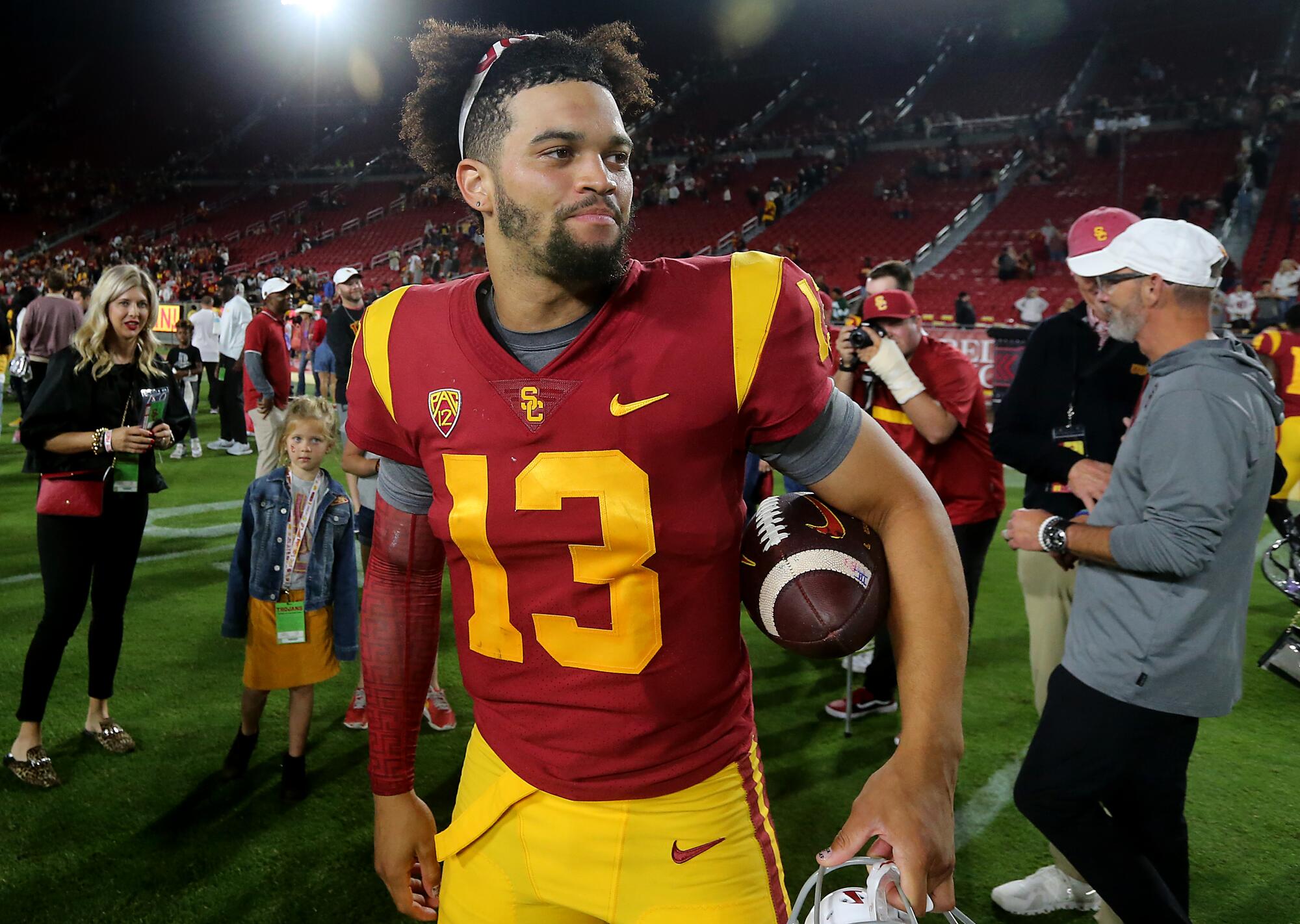
But by the final week of the regular season, that sort of casual wizardry had become routine for Williams. There was the effortless, 75-yard score against Stanford, the do-or-die drive and game-winning dart at Oregon State, the no-look touchdown pass against Colorado. With every successive game, Williams seemed to conjure a new, stunning way to scramble, flipping a Sun Devil defender over his shoulder one week, before spinning and dancing past a Utah linebacker the next. His poise in the pocket often appeared to approach the supernatural.
“I think it’s black magic,” Travis Dye, USC’s top running back, said earlier this season. “I don’t understand it either!”
The magic would ultimately run out in Las Vegas, with searing pain coursing through his hamstring and tears welling in his eyes. Just a sophomore, Williams will get another shot to lead USC to a College Football Playoff national title before the NFL comes calling. But in just one season, Williams has already left an indelible mark on USC, dancing and dazzling his way into the record books, exceeding every possible expectation on his path to the Heisman Trophy.
Caleb Williams and his father share the strategies they have used to put the USC quarterback in the best position to win on and off the field.
More to Read
Go beyond the scoreboard
Get the latest on L.A.'s teams in the daily Sports Report newsletter.
You may occasionally receive promotional content from the Los Angeles Times.

